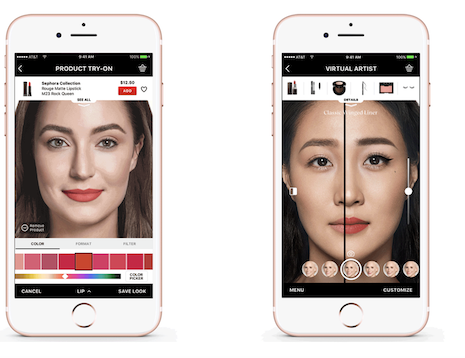- About
- Subscribe Now
- New York,
August 20, 2020

 Sephora's Product Try On and Virtual Artist apps. Image credit: Sephora
Sephora's Product Try On and Virtual Artist apps. Image credit: Sephora
Customer expectations have changed rapidly during the coronavirus pandemic, and brands and retailers have to respond accordingly and rethink their approach to customer engagement and experience.
According to KPMG’s 2002 U.S. Customer Experience Excellence (CEE) Report, companies that were able to maintain customer dialogues were more successful than those who did not, whether it was as a result of business models or government restrictions. Purpose-driven brands or those with adaptive online experiences have continued to build relationships with consumers.
The findings were based on a survey of 11,000 consumers in the United States. They rated 300 brands across six categories.
CX during COVID
KPMG identified six “pillars” of customer experience: personalization, time and effort, integrity, expectations, resolution and empathy. The best performing brands outperformed the market in ratings for integrity and empathy, as consumers perceived those companies acted in the best interest of the customer.
"With COVID-19 and the move to online, the nature of the relationship between brands and their customers has changed, bringing the need for commercial cadence to the forefront," said Julio Hernandez, U.S. Customer Advisory Practice lead at KPMG, in a statement.
The top 10 brands include financial firms as well as several fast food and grocery market chains. The United Services Automobile Association landed the top overall spot, marking five consecutive years in the top five for KPMG’s CEE rankings.
LVMH-owned Sephora jumped 63 spots in the index, as the beauty retailer was able to replicate the in-store experience, curtailed due to COVID-19, online with artificial intelligence technology.
Elsewhere, Amazon’s Zappos improved 68 places as a leader in “time and effort,” minimizing customers’ efforts with frictionless processes.
For instance, Zappo’s Run-on-One campaign supports runners by having customer loyalty agents periodically call offering encouragement. Furthermore, runners have a 30-day return window for their sneakers regardless have many miles were run as they were adjusting to the fit.
KPMG also identified specific strategies that have helped the brand leaders find success during COVID-19.
A frictionless customer journey end-to-end, including secure payment options, further incentivizes shoppers. This starts with identifying customer behaviors to develop insight-driven strategies.
Data-driven decisions are essential to improving the customer experience, from the supply chain to ecommerce.
During a presentation at LuxeCX/AMCX 2019 on Sept. 25, a principal from IBM shared examples of how luxury brands have changed their strategies based on customer data. The evolving retail environment has led to a wealth of data, but brands often need guidance and the right tools to best interpret the data and implement their findings (see story).
Share your thoughts. Click here